CRM69091
Dinotefuran
certified reference material, TraceCERT®, Manufactured by: Sigma-Aldrich Production GmbH, Switzerland
Synonym(s):
(RS)-N-Methyl-N′-nitro-N″-[(tetrahydro-3-furanyl)methyl]guanidine
About This Item
Recommended Products
grade
certified reference material
TraceCERT®
Quality Level
product line
TraceCERT®
shelf life
limited shelf life, expiry date on the label
manufacturer/tradename
Manufactured by: Sigma-Aldrich Production GmbH, Switzerland
format
neat
storage temp.
2-8°C
SMILES string
CN\C(N[N+]([O-])=O)=N/CC1CCOC1
InChI
1S/C7H14N4O3/c1-8-7(10-11(12)13)9-4-6-2-3-14-5-6/h6H,2-5H2,1H3,(H2,8,9,10)
InChI key
YKBZOVFACRVRJN-UHFFFAOYSA-N
Looking for similar products? Visit Product Comparison Guide
Related Categories
General description
Certified content by quantitative NMR incl. uncertainty and expiry date are given on the certificate.
Download your certificate at: http://www.sigma-aldrich.com
Dinotefuran is a third-generation chiral neonicotinoid insecticide, used against sucking, biting, and public health insects such as mosquitoes, ticks, beetles, aphids, whiteflies, and leaf hoppers. It disrupts the insect nervous system by exhibiting agonistic activity towards the nicotinic acetylcholine (ACh) receptors (nAChR) and affecting the cholinergic synaptic transmission.
Under the Regulation (EC) No 1107/2009 and revoking the Council Directives 79/117/EEC and 91/414/EEC, dinotefuran is not approved for its use as a plant protection agent in the European Union (EU). But a default maximum residue limit (MRL) of 0.01 mg/kg is set for dinotefuran in accordance with Art 18(1)(b) Reg 396/2005.
Application
The dinotefuran CRM may also find given below uses:
- Development of a method to simultaneously determine dinotefuran and its 3 polar metabolites in plum samples using dispersive-solid phase extraction procedure (d-SPE) followed by liquid chromatography-tandem mass spectrometry (LC-MS/MS)
- Potentiometric determination of dinotefuran residues in soil and cucumber samples by using novel molecularly imprinted polymeric (MIP) material based sensors
- Evaluation of an ultra high-performance liquid chromatography-tandem triple quadrupole mass spectrometry based method for the detection and quantification of dinotefuran and its metabolites in products of plant (watermelon, cucumber, rice) and animal (milk, egg, and pork) origin and also environmental samples of soil and water
- Multi-residue analysis of pyridaben, dinotefuran, and metabolites of dinotefuran in soil and eggplant samples with a modified QuEChERS based sample extraction and rapid resolution liquid chromatography-triple quadrupole-tandem mass spectrometry (RRLC-QqQ-MS/MS)
- Quantitative analysis of dinotefuran and its two metabolites in rice plant samples by high-performance liquid chromatography-tandem mass spectrometry (HPLC-MS/MS)
- Development of a method to determine residues of dinotefuran and its two major metabolites in apple samples by QuEChERS based sample pre-treatment and liquid chromatography-tandem mass spectrometry (LC-MS/MS)
Legal Information
Not finding the right product?
Try our Product Selector Tool.
Signal Word
Warning
Hazard Statements
Precautionary Statements
Hazard Classifications
Eye Irrit. 2
Storage Class Code
11 - Combustible Solids
WGK
WGK 3
Flash Point(F)
Not applicable
Flash Point(C)
Not applicable
Certificates of Analysis (COA)
Search for Certificates of Analysis (COA) by entering the products Lot/Batch Number. Lot and Batch Numbers can be found on a product’s label following the words ‘Lot’ or ‘Batch’.
Already Own This Product?
Find documentation for the products that you have recently purchased in the Document Library.
Our team of scientists has experience in all areas of research including Life Science, Material Science, Chemical Synthesis, Chromatography, Analytical and many others.
Contact Technical Service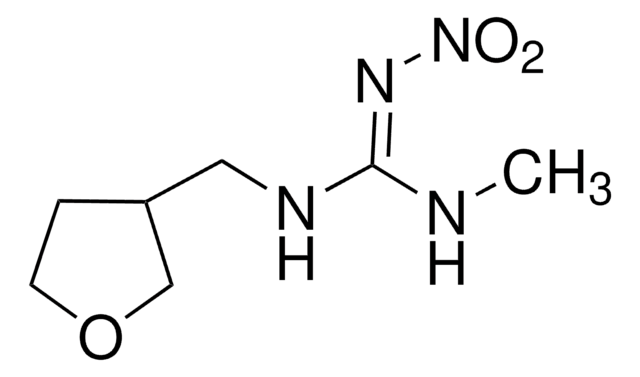
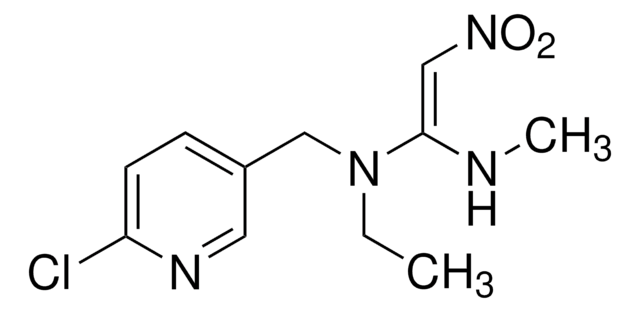
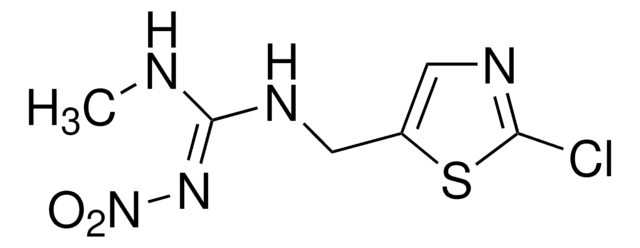
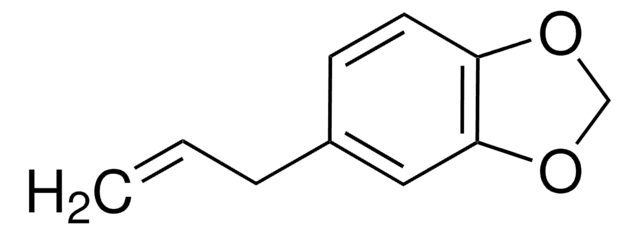
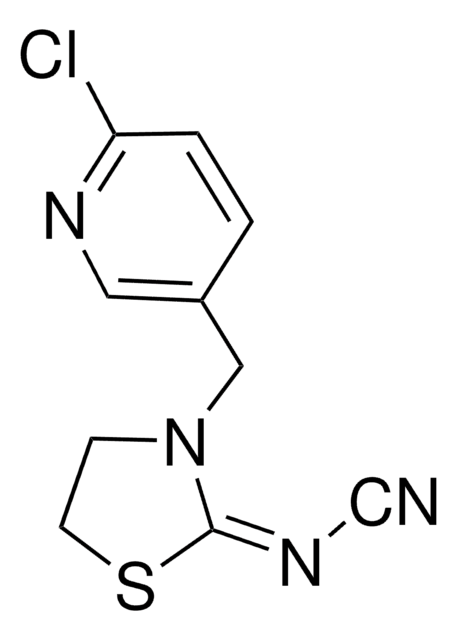

![Benzo[a]pyrene certified reference material, TraceCERT®, Manufactured by: Sigma-Aldrich Production GmbH, Switzerland](/deepweb/assets/sigmaaldrich/product/structures/253/820/be96d879-1811-46c0-8f11-612019691c2d/640/be96d879-1811-46c0-8f11-612019691c2d.png)


